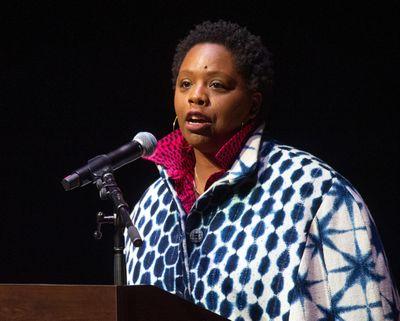Black Lives Matter co-founder Patrisse Cullors encourages community organization

Black Lives Matter co-founder Patrisse Cullors had a suggestion for audience members asking how to rectify issues in their communities: organize.
“You have to band together,” Cullors told a capacity crowd at a free lecture Thursday at Gonzaga University.
Cullors started recounting the roots of becoming an activist with her experience as a 16-year-old in 1999 hearing the news about her brother, who was later diagnosed with schizoaffective disorder, nearly being beaten to death by Los Angeles County sheriff’s deputies while in custody.
She spent the next decade working with the Bus Riders Union organizing around climate change and the school-to-prison pipeline, a term used to describe the tendency of young adults from disadvantaged backgrounds to become incarcerated. Then, in 2011, the year her brother was released from prison, she came across the American Civil Liberties Union report detailing years of abuse against inmates in the Los Angeles jail system.
“It was one of the first times in my life that this secret we had in our family had been opened up,” Cullors said.
Cullors realized there was a need for organization around survivors and their families, which became the Coalition to End Sheriff Violence in L.A. Jails.
She said it was the first time many spoke publicly due to deeply held trauma and shame.
“We decided we were not going to be silent,” Cullors said.
Cullors co-founded the Black Lives Matter movement in 2013 as outrage surrounding many decades of police brutality toward Black people reached its peak amid the killing of Trayvon Martin.
“We wanted to stand up and fight back,” Cullors said. “This wasn’t just about protest. This was about survival.”
After years of challenging elected officials, Cullors said she was shocked to see Donald Trump elected president. She had been celebrating legalizing marijuana in California and potentially rolling back years of convictions related to the drug when the results started coming in.
She was depressed for weeks. She planned to leave the country. But then the organizer in her came back about a month later.
“This is where I live, and I’m going to fight like hell for this place,” Cullors recalled.
At that point, Cullors decided to challenge the construction of two new jails in Los Angeles, later launching Justice LA with more than 30 organizations. Local officials began meeting with organizers after they set up 100 replica jail beds downtown, which closed streets for hours.
“The jail is a symbol of what our county is willing to invest in,” Cullors said.
County officials read a ballot measure focused on jail reform at a public meeting in December 2017 after organizers collected thousands of signatures.
By January 2018, Cullors said, the county’s tone changed: “A new conversation about what kind of services we needed, what kind of infrastructure we needed stared to be developed.”
Cullors said she saw plans to build a new women’s jail come to a halt in January 2019. Then, in August, the county chose to cancel a contract to build a new men’s jail. Meanwhile, organizers gathered about 250,000 signatures to put a reform bill on the March ballot.
The success of opposition to building new jails and support for criminal justice reform is a reminder of the power of the people, Cullors said.
“I want to remind every single one of you that you have a local fight here,” Cullors said. “It’s a rubric about what’s possible for the rest of the country.”
Cullors also had advice for Spokane’s elected officials attending the lecture after an audience question: “What goes a long way for community members is being deeply listened to. What goes even further is taking action.”